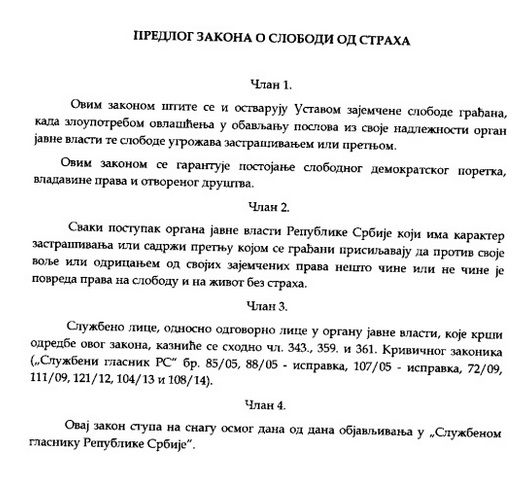Nineteen representatives of the Serbian National Assembly filed a proposal for a new law that would guarantee Serbian citizens freedom from fear. While freedom from fear is allegedly a right guaranteed by the Constitution of the Republic of Serbia, some ruling politicians in Serbia have brought it into question in recent months through apparent abuse of power.

Screenshot of a page of the official proposal of the Law on Freedom from Fear, as posted by Deputy Speaker of the Serbian National Assembly Gordana Čomić on Slideshare, used with permission.
The proposal comes from opposition assembly representatives who are members of the Democratic Party (Demokratska stranka – DS) and the New Party (Nova stranka – NS). Of the 250 representatives in the Serbian Assembly, elected in an early parliamentary election in March 2014, 158 are members of the Serbian Progressive Party (Srpska napredna stranka – SNS), led by current Prime Minister Aleksandar Vučić. Prime Minister Vučić and his collaborators have often been in the news throughout 2014 for pressuring media and individuals. Vučić has denied these claims, but some of his cabinet's practices are becoming apparent.
Journalist Milena Knezevic wrote for Index on Censorship earlier in 2014:
Index has tracked the media freedom situation in Serbia since the early days of the current government. There have been reports of a journalist being interrogated by police for sharing a Facebook post, as well as physical and verbal attacks — often with impunity. But indirect control of media, smear campaigns and other methods of covert “soft censorship” also pose a serious challenge to Serbian press freedom. “Milošević never muzzled the media this perfidiously. His methods were far less sophisticated and everything was out in the open,” said Beckovic [a prominent journalist]. And it seems her colleagues agree that censorship is prevalent. Ninety per cent of journalists responding to a recent survey said censorship and self-censorship does exist in Serbian media, while 73% and 95%, respectively, said the media does not report objectively and critically.
The full proposal for the Law on Freedom from Fear, filed on November 20, 2014, was posted by Democratic Party member and Deputy Speaker of the Serbian National Assembly Gordana Čomić on her personal Slideshare account. Part of the submitted document explains the reasons for bringing forth the proposal:
II Razlozi za donošenje zakona
Razlozi za donošenje ovog zakona sadržani su, pre svega, u potrebi da se zaštite Ustavom zajemčeni slobode građana u slučajevima kada su te slobode ugrožene od strane organa javne vlasti[…] Smatramo da niko, a naročito organi javne vlasti, ne smeju da zloupotrebom ovlašćenja prilikom obavljanja poslova iz svoje nadležnosti zastrašuju građane Republike Srbije, i stvaraju stanje straha i neizvesnosti, pri čemu se građani prisiljavaju protiv svoje volje da nešto čine ili ne čine.
II Reasons for passing the law
The reasons for passing this law consist of, above all, the necessity to protect civic freedoms guaranteed by the Constitution in cases when those freedoms are violated by governments authorities[…] We deem that no one, especially government authorities, is allowed to incite fear in citizens of the Republic of Serbia through abusing authority while conducting duties within their jurisdiction, or create a state of fear and incertitude, forcing citizens to, against their will, do or not do something.
In a short conversation with Global Voices on November 22, 2014, Deputy Speaker Gordana Čomić said that she hoped all National Assembly representatives would understand not only the importance of passing this law, but the importance of bringing it forth before the Assembly for discussion at the soonest possible date. In accordance with Assembly procedures, the soonest possible date for the proposed law to reach the floor of the National Assembly is 15 days from the date of filing, while Ms. Čomić expects the date for discussing the proposed law in the Assembly will be on December 10, 2014.







1 comment